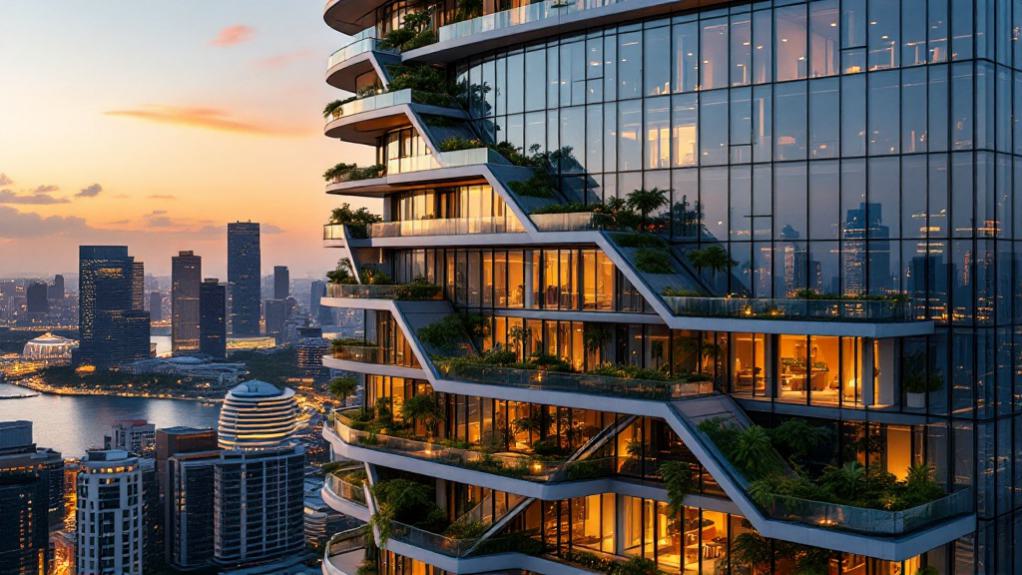Singapore’s real estate regulatory framework involves multiple agencies, including the Urban Redevelopment Authority and Building and Construction Authority. Foreign ownership is strictly regulated, with non-residents facing a 60% Additional Buyer’s Stamp Duty and restrictions on landed properties. HDB housing incorporates social policies through Ethnic Integration Policy and Minimum Occupation Period requirements. Recent cooling measures include reduced Loan-to-Value limits and a mandatory wait-out period for private property owners. Understanding these complex regulations proves essential for successful property transactions in this highly controlled market.

How does one successfully navigate the intricate web of Singapore’s property regulations without falling afoul of its stringent requirements? Singapore’s real estate market operates under the vigilant oversight of multiple regulatory bodies, each with distinct jurisdictions: the Urban Redevelopment Authority manages land use planning, the Building and Construction Authority enforces building standards, while the Council for Estate Agencies regulates property agents and their transactions.
The framework for foreign ownership in Singapore presents a nuanced structure of permissions and restrictions. While foreigners may purchase private condominiums and apartments without special approval, landed properties require explicit permission from the Singapore Land Authority, with Sentosa Cove offering a notable exception with fewer restrictions. The implementation of a substantial 60% Additional Buyer’s Stamp Duty for foreigners represents a significant financial consideration in property acquisition calculations. The Residential Property Act establishes specific limitations on foreign ownership to safeguard national interests while allowing controlled investment opportunities. The April 2023 ABSD rate increases were specifically targeted to moderate demand, with foreign buyers facing the most substantial increase in stamp duty rates.
Foreign investors face a 60% ABSD hurdle while navigating Singapore’s tiered property ownership system designed to regulate market access.
Singapore’s property cooling measures have evolved to maintain market stability through various mechanisms. The Loan-to-Value limit for HDB loans has been reduced to 75% as of 2024, while the Total Debt Servicing Ratio threshold has been tightened to prevent over-leveraging. Recent data shows that private home prices experienced a sharp 2.3% rebound in Q4 2024, prompting government signals about potential new cooling measures. Private property owners must now observe a 15-month wait-out period before purchasing HDB flats, a measure designed to moderate demand across different property segments.
The regulatory landscape for HDB housing encompasses social policies such as the Ethnic Integration Policy, which maintains racial harmony in public housing estates, and the Minimum Occupation Period of five years before resale is permitted.
Commercial properties operate under a comparatively less restrictive regulatory environment, with foreigners permitted to purchase such assets without approval, though specific tax considerations apply.
Strata-titled properties are governed by the Building Maintenance and Strata Management Act, which establishes the framework for Management Corporation Strata Titles to oversee common property.
Looking forward, Singapore’s real estate regulations continue to evolve, with increasing emphasis on sustainable building practices, digitalization of property transactions, and potential adjustments to foreign ownership policies to balance market accessibility with long-term stability.
Frequently Asked Questions
What Penalties Apply for Violating the Residential Property Act?
Violations of the Residential Property Act incur severe penalties, including fines up to $100,000 for unauthorized purchases, imprisonment up to 3 years, and forced property divestment within mandated timeframes.
Unauthorized rental attracts penalties of up to three times the rental income or $10,000, whichever is higher.
False declarations may result in $5,000 fines or imprisonment up to 6 months, while non-compliant developers face extension charges and potential exemption revocations.
Can Foreigners Purchase HDB Resale Flats?
Foreigners generally cannot purchase HDB resale flats.
Only Singapore Citizens and Permanent Residents are eligible to buy these properties, with specific restrictions applying to each category.
Permanent Residents must form a family nucleus with another PR or Singapore Citizen, while non-citizen spouses of Singaporeans may be included in a family nucleus for purchase eligibility.
Privatized HUDC flats, however, are considered private property and remain accessible to foreign buyers.
How Do Cooling Measures Affect Property Investment Returns?
Singapore’s cooling measures markedly impact property investment returns through multiple mechanisms, including increased transaction costs via higher Additional Buyer’s Stamp Duty rates, reduced borrowing power from tighter loan-to-value limits, and compressed rental yields, particularly in prime areas where yields have contracted from 3-4% to 2-3%.
Consequently, investment strategies have adapted toward longer holding periods, value-add opportunities, and alternative segments such as commercial properties, while market dynamics reflect diminished speculative activity and a greater focus on property fundamentals.
Are There Tax Incentives for First-Time Singaporean Homebuyers?
For first-time Singaporean homebuyers, Singapore offers several tax incentives and housing grants rather than direct tax deductions.
The Enhanced CPF Housing Grant provides up to S$80,000 for eligible buyers, while the CPF Housing Grant for resale flats offers up to S$50,000 for families.
The Proximity Housing Grant provides additional support of up to S$30,000 for those living with or near parents.
These grants effectively function as financial incentives, reducing the overall property acquisition costs.
What Legal Recourse Exists for Construction Defects in New Properties?
Singaporean homeowners have multiple legal remedies for construction defects. During the one-year Defects Liability Period, developers must rectify issues at their expense.
Beyond this period, latent defects remain actionable for up to 15 years under statutory provisions.
Aggrieved parties may pursue resolution through Small Claims Tribunals (for claims up to S$20,000), mediation services like CASE, or litigation for complex cases.
Contractual agreements often stipulate mandatory mediation or arbitration before court proceedings may commence.





